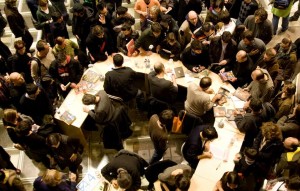CULTURE BilBOlBul, the Serious Side of Comics
The international festival of comics Bilbolbul opened last Thursday, preceded by a series of events as a sort of appetizer, a glimpse into the real program.
The ninth edition of the international festival of comics in Bologna has been organized in autumn for the second time, thus creating along with Lucca Comics a real “comics season” in Italy.
The first event, as in BilBOlBul tradition, was a serious one: the round table “Social or dissociated”, in fact, brought cartoonists and illustrators to discuss communication, with the aim of rethinking together new issues related to their craft. Which channels do they use? Which are the benefits of being in or out social networks? A passionate and interesting comparison of different points of view, thanks to the presence of several authors who have focused on their methods and on how (and if) Facebook, Instagram and the like button have changed the way they work.
They are topics of extraordinary relevance, that have been chosen to open a festival that has dedicated its ninth edition to an exploration of the language of comics and to how comics evolve in accordance with the change of developing technologies and new forms of enjoyment and consumption of “cultural objects”.
Scott McCloud, fifteen years ago, had already predicted what he called “the infinite canvas”, and spoke of the development of web comics, but today the territory to explore is still vast, although the language of comics is open to hybrid contamination since birth, ready to grow in new and different ways, both digitally and on paper. These are topics that have been addressed also by Comics & Jews, the special pages dedicated to the relationship between comics and Jewish culture, distributed along with Pagine Ebraiche by BilBOlBul. But Comics&Jews had been presented originally at Lucca Comics, with Asaf Hanuka and Boaz Lavie together with Giorgio Albertini and the heads of the two largest Italian festival dedicated to comics: Giovanni Russo for Lucca and Emilio Varrà for Bologna, together with the journalists responsible for it.
And the festival in Bologna, closed on Sunday, has been four days of hybridizations between discussions, workshops, meetings, and special attention to young authors, with the novelty of BBBZines, two trading days with the self-produced foreign magazines in addition to the traditional portfolio review. And many different exhibitions, and more events throughout the city in what is more and more a real joy for comics lovers. A feast for those who want to stop and think, and discuss. Because there is quite some seriousness in comics.

